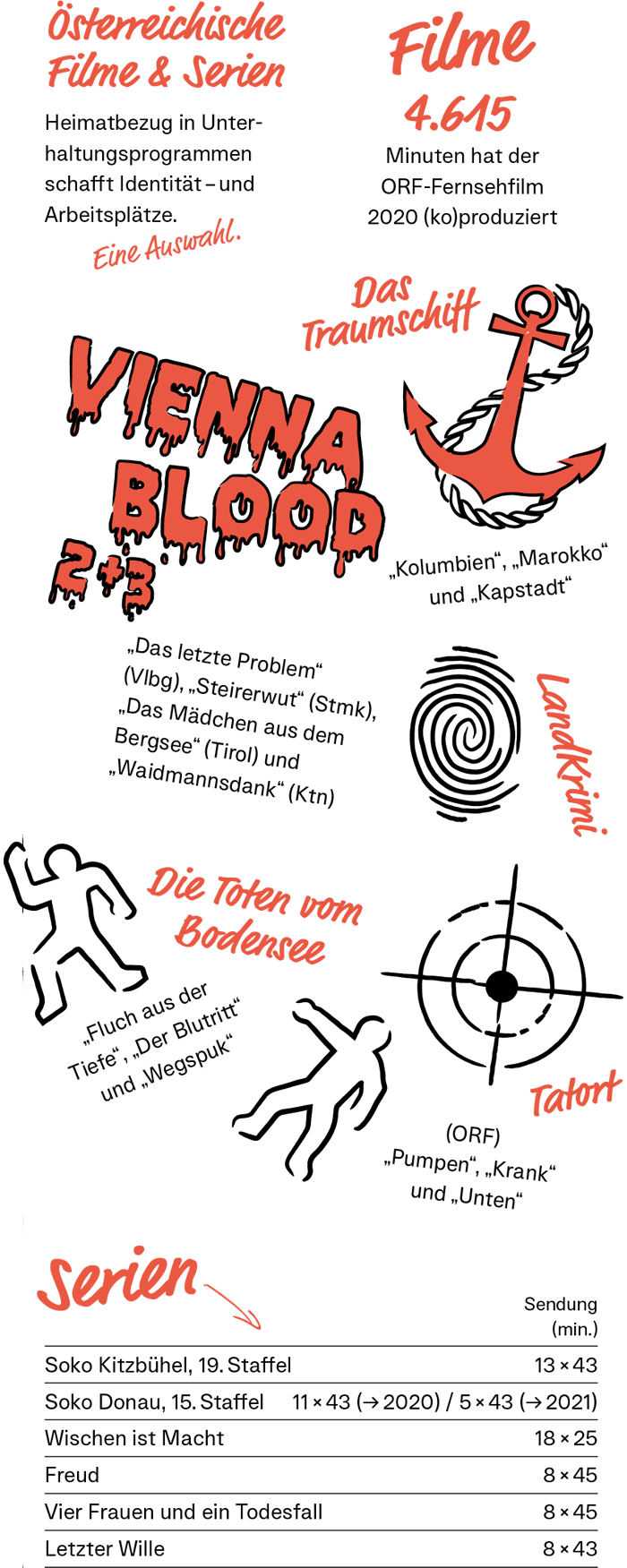Back to overview
Katharina Schenk, Head of TV Film
#78 Is it allowed to dream?
Movies, series, sitcoms, short films - everything fictional that we like to watch has conquered a new habitat, and not just since yesterday. From linear reception on traditional television, countless stories have made their way into viewers' living rooms and, above all, mobile devices via streaming, VOD, SVOD, media libraries, social networks and sharing platforms. It is impossible to imagine the digital world without fictional productions. I would like to assume that digital playout channels will not completely replace linear television. But you have to be honest enough to know that without a digital outlet, you lose presence as a TV broadcaster.
So far, ORF has not been able to use the variety of online options for its programming. This could be the end of the discussion on Austrian fiction on the Internet. But it is not. Over the years, its online presence has become just as creative as its content. The direct digital path to films, series and the like made by ORF is currently the 7-day catch-up option on Tvthek and the Flimmit platform. But that is only the surface. In order to be able to offer our viewers a broader digital range of services, there is, on the one hand, the now established tradition of program-accompanying content on the one hand and, on the editorial level, a wealth of offers aimed at the hopefully soon dawning time of greater possibilities.
But one thing at a time.
In cooperation with the colleagues who coordinate and manage ORF's social media presence, content is being thought up and developed, especially in the area of series, which can be used to accompany broadcasts. An example? For the first season of "Walking on Sunshine," there was a series of trenchant farmers' rules that the main character, the self-absorbed weather presenter Otto Czerny-Hohenburg (portrayed by Robert Palfrader), made the best of for ORF's FB community.
At the start of the broadcast of the series "Letzter Wille," the main actors Johannes Zeiler and Brigitta Kanyaro were on Instagram with a wordrap. Outtakes and reports by the actors from filming have also become part of everyday fictional digital life.
What is not everyday, however, are the possibilities that would open up if ORF's radius of action in the digital world were to expand, if it were suddenly possible to make content available online only. Here, the editorial considerations (one would almost have to say dreams at the moment) are divided into four categories: dual-use projects, spin-off formats, topic bars and finally the "playground".
Dual-use projects should be designed in such a way that they offer two different formats, one of which is suitable for linear broadcasting, while the other suggests digital use. This can be the classic 45-minute format for a coherent series of feature-length films - a strategy used by ZDF and ARD for subsequent use in the Mediathek. But it can also be projects that are thought of this way from the beginning. One such project we're developing is an episodic film that tells independent stories that are thematically linked to each other and total 90 minutes in length. However, the individual episodes can also be consumed online as independent short films beyond the broadcast scheme. Here, there is an additional opportunity to bring together established filmmakers with up-and-coming talent, especially on the screenplay side.

Spin-off formats are small narrative worlds that can emerge from series. Whether they are 2-10 minute episodes featuring a secondary character from a series (e.g. "Lammert's Leichen," a web series featuring MDR's Tatort pathologist) or, for example, insights into what a fictional policewoman from a crime series does - there are many possibilities.
Topic bars, on the other hand, would be easy to fill and could possibly also illuminate areas of fictional creation in Austria for which there are no adequate broadcasting areas. For example, a curated area for Austrian short film (which is co-financed by ORF through the film/television agreement) could be considered. Or a cooperation with the film academy to make final projects more widely accessible.
And finally, the "playground." Everything from original web series to short film competitions could take place here. That is and remains a question of possibilities and resources. But one must be allowed to dream.
Last but not least, the year 2020 has brought a strong push towards the digital, especially in the fictional field - and here especially for feature films. Entire festivals have switched to online, with virtual screening rooms and networking platforms. At Diagonale '20, there was a cooperation between Diagonale and Flimmit to bring filmmaking to a broad audience. The AFC offers "All you can watch" (
https://watch.austrianfilms.com/page/all-you-can-watch), a digital entrance to the world of Austrian cinema.
All in all, the theme of fiction in digital space - as in any story - is about surprising twists, innovative approaches and thinking across boundaries. For fictional programs, the digital space is not simply a surface for reuse; it holds opportunities for further development and new collaborations. Editorially, it's an incredibly exciting task to think about this. And at some point, fiction will become real digital.




 Spin-off formats are small narrative worlds that can emerge from series. Whether they are 2-10 minute episodes featuring a secondary character from a series (e.g. "Lammert's Leichen," a web series featuring MDR's Tatort pathologist) or, for example, insights into what a fictional policewoman from a crime series does - there are many possibilities.
Spin-off formats are small narrative worlds that can emerge from series. Whether they are 2-10 minute episodes featuring a secondary character from a series (e.g. "Lammert's Leichen," a web series featuring MDR's Tatort pathologist) or, for example, insights into what a fictional policewoman from a crime series does - there are many possibilities.